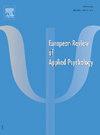Role of human resource practices and job crafting in fostering innovative work behavior: An interaction and resource reinvestment perspective
IF 1.4
4区 心理学
Q3 PSYCHOLOGY, APPLIED
European Review of Applied Psychology-Revue Europeenne De Psychologie Appliquee
Pub Date : 2024-09-01
DOI:10.1016/j.erap.2023.100938
引用次数: 0
Abstract
Introduction
Prior research has focused on management-centric view of HR practices and emphasized employees as passive recipients of such practices. Nevertheless, contemporary research advocates a different perspective by emphasizing that employees can also take self-initiative and proactively engage by redesigning their job contents in order to better translate the impact of HR practices into innovative work behavior (IWB).
Objective
Drawing upon the conservation of resources (COR) theory, this study aims to examine how job crafting contributes to individuals’ bottom-up proactive responses to HR practices that encourage innovative behaviors at work. To make the results more substantive, the moderating role of creative self-efficacy has also been investigated.
Method
The data were collected from academic staff and their respective department heads representing four universities located in Pakistan.
Results
The results revealed that job crafting provides an intervening mechanism in the relationship between ability-motivation-opportunity-enhancement human resources practices (AMO-HRMPs), and creative self-efficacy moderates this relationship.
Conclusion
These findings have implications for department heads who are interested in creating an environment that encourages innovation through job crafting.
人力资源实践和工作设计在促进创新工作行为中的作用:互动与资源再投资视角
导言:以往的研究侧重于以管理为中心的人力资源实践观点,强调员工是这些实践的被动接受者。本研究以资源保护(COR)理论为基础,旨在探讨工作设计如何促进个体自下而上地积极应对人力资源实践,从而鼓励工作中的创新行为。为了使研究结果更具实质性,还对创造性自我效能感的调节作用进行了调查。方法数据收集自巴基斯坦四所大学的学术人员及其各自的系主任。结果研究结果表明,在能力-动机-机会-提高人力资源实践(AMO-HRMPs)之间的关系中,工作设计提供了一种干预机制,而创造性自我效能感对这种关系起着调节作用。结论这些研究结果对有意通过工作设计营造鼓励创新环境的系主任具有启示意义。
本文章由计算机程序翻译,如有差异,请以英文原文为准。
求助全文
约1分钟内获得全文
求助全文
来源期刊

European Review of Applied Psychology-Revue Europeenne De Psychologie Appliquee
PSYCHOLOGY, APPLIED-
CiteScore
2.20
自引率
20.00%
发文量
38
期刊介绍:
The aim of the Revue européenne de Psychologie appliquée / European Review of Applied Psychology is to promote high-quality applications of psychology to all areas of specialization, and to foster exchange among researchers and professionals. Its policy is to attract a wide range of contributions, including empirical research, overviews of target issues, case studies, descriptions of instruments for research and diagnosis, and theoretical work related to applied psychology. In all cases, authors will refer to published and verificable facts, whether established in the study being reported or in earlier publications.
 求助内容:
求助内容: 应助结果提醒方式:
应助结果提醒方式:


